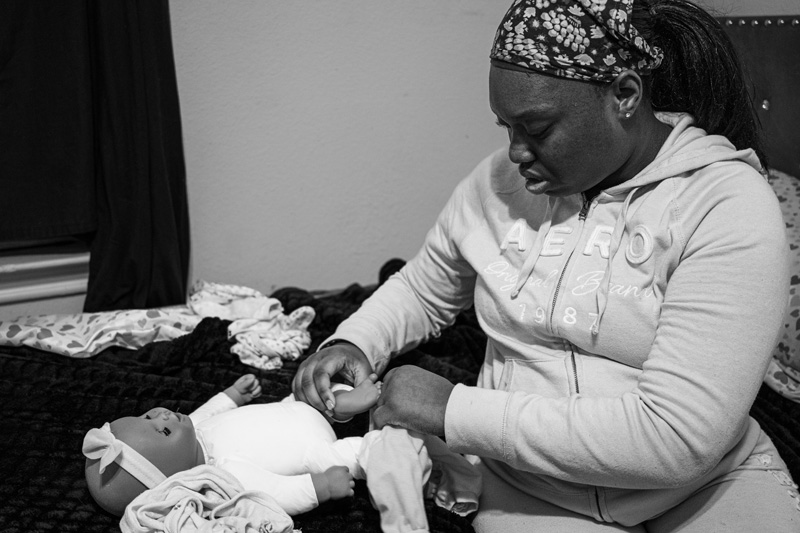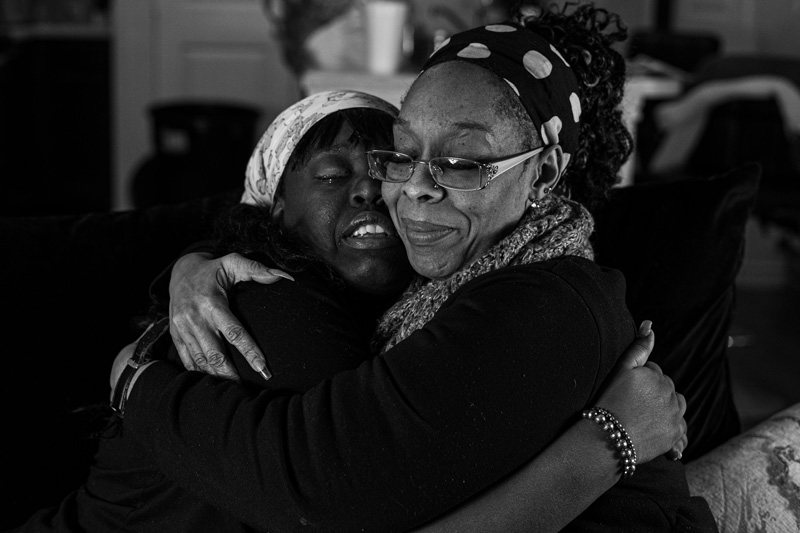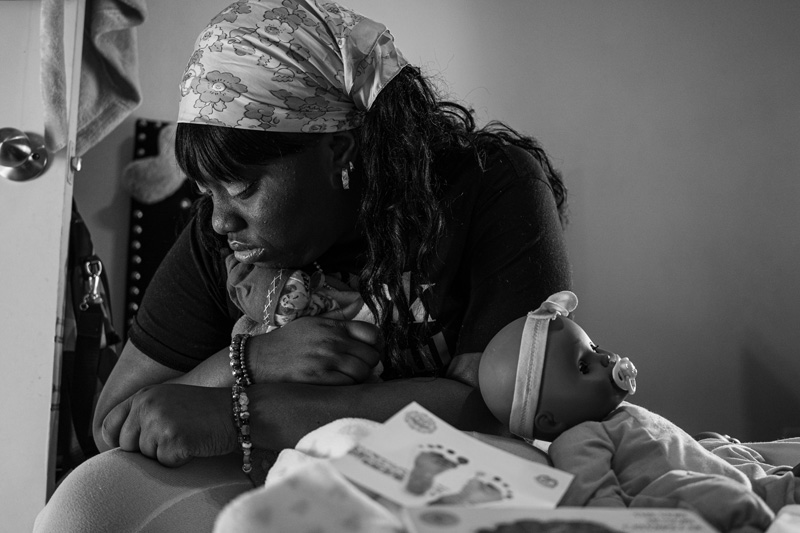Zenorah was barely one week old when doctors took her off life support. She exhaled her last breath in the arms of her grandmother.
“I held her until she was, you know,” Kimberly Hammond said. “I held her until she went on and her body was cold. It was like somebody ripped out my soul.”
Zenorah’s official cause of death was asphyxiation — her umbilical cord was tightly wrapped around her neck, suffocating her.
The unofficial cause of death, as her family argues, is a deplorable Tarrant County Jail. Zenorah was born there on May 5, 2020. Mother Chasity Congious was left to bleed out and suffer in a cell for hours before she was given medical attention, says Jerrett Adams, a national attorney representing Congious and her mother in an ongoing wrongful death lawsuit against Tarrant County. By the time Zenorah reached John Peter Smith Hospital in mid-May of that year, she was brain dead due to a lack of oxygen.
As Hammond talked, Congious sat beside her at their Northside apartment holding a baby doll.
Do you often think of Zenorah, I said. Congious’ eyes widened.
“She is so cute,” she replied ecstatically. “She is the cutest. I love what God gave me.”

Jason Brimmer
Adams told me before the meeting that Congious often talks about her deceased baby in the present tense. Hammond said her cognitively impaired daughter has only recently found the right blend of mood-stabilizing medications. Due to the amount of work it takes to monitor her, Hammond is able to work only part-time, meaning her family relies on state-funded nonprofits like MHMR (My Health, My Resources) and JPS for checkups and prescriptions. During visits with either group, Congious rarely sees a physician, Adams said, and if he wins his lawsuit or settles with the county, Congious may finally receive the medical attention she needs and deserves, her mother said.
Before Zenorah’s death, Hammond said she viewed cops as the “good guys.” She lost faith in our local justice system after Fort Worth police arrested Congious in 2020 after she had experienced a mental health flare-up during her second trimester and needed to be taken to JPS — not jail. Her three months in confinement were equally disillusioning to her mother.
“The hospital called to tell me my daughter gave birth but not the jail,” Hammond said. “The sheriffs never called. During that whole ordeal and after Chasity returned back to the jail [after Zenorah died], they wouldn’t let me check on her. We owe everything to our children. I haven’t grieved because [the county has] not been held accountable. They are still trying to cover it up.”
The Tarrant County Sheriff’s Department, which oversees the county jail, continues to ignore our requests for comment.
Based on open records requests, the Texas Commission on Jail Standards, which compiles in-custody jail death data, says Tarrant County Jail logged 17 custodial deaths in 2020 and 13, 11, and nine deaths the years following. For unexplained reasons, Zenorah was not included in the 2020 records.
Adams is seeking monetary damages. The suit filed in January 2022 is now in mediation, and Adams said county leaders recently made a settlement offer that may help cover treatment and housing costs for Congious. A quality facility in North Texas, he said, would cost $5,000 to $7,500 per month.

Photo by Jason Brimmer.
Congious’ case underlines a disturbing trend. The Texas Tribune says the federal government has designated 98% of the state’s 254 counties as “mental health professional shortage areas.” The Tribune estimates that more than 2,000 members of Texas’ jail and prison population are waiting for a bed in the state hospital system. Nationally, 44% of state-run jail detainees have at least one diagnosed mental health disorder.
Texas has a “chronic problem” of allowing men and women with intellectual disabilities and mental health diseases to become stuck in the criminal justice system, said Texas Jail Project executive director Krish Gundu.
The systemic problems that lead to cases like Congious’ are complex, Gundu said, and our state’s underfunded mental health system — ranked last in a recent study by Forbes — is a major factor but only one of many. Gundu’s nonprofit works to improve the conditions within our state jails while advocating against mass incarceration policies, but too often, she said, hospitals and public health groups like MHMR dodge criticism.
“Many of these people go to hospitals only to be arrested,” she said. “It is shocking how many people are criminalized in the very places they go to for help.”
*****
When Adams heard about Zenorah’s death, he said he couldn’t sleep. He soon contacted Hammond, Congious’ legal guardian, and offered to represent them. Suing the government for monetary damages can be a long and complicated process, he told us that month (“ Justice for Chasity,” Jan. 2022). He initially filed a lawsuit against Fort Worth police, the City of Fort Worth, and Tarrant County for Zenorah’s death, but District Judge Reed O’Connor ruled that the officer who wrongfully arrested Congious, David Nguyen, was protected by the legal doctrine of qualified immunity, which often shields peace officers from liability for misconduct in all but the most egregious circumstances. The district court did find grounds for suing the county based on the disproportionate number of deaths at Tarrant County Jail.
Judge O’Connor wrote, “The overall statistics that Tarrant County Jail has failed three inspections in the past seven years, has the highest inmate mortality rate in North Texas, and has a mortality rate 3.5 times higher than Dallas County Jail should put a reasonable policymaker on notice about potential condition of confinement issues at the jail. Based on the court’s own analysis and bolstered by the findings of the other courts in this district, the court finds that the plaintiff has successfully articulated” that the jail’s unsafe conditions can be the subject of a lawsuit against the county that manages the jail, Tarrant County.

Photo by Edward Brown
Few publications outside the Weekly showed interest in covering the story, Adams said, adding that race likely plays a role in the lack of mainstream media coverage. In November, he updated us on the lawsuit, expressing his frustration with the county’s less-than-earnest attempts to comply with court-ordered releases of evidence which would allow him to prepare his case should it go to jury trial.
“We had court today,” he told us, referring to the ongoing mediation and discovery process. “They gave us 60,000-plus documents. We are making our way through them.”
Most of the documents, he said, are completely irrelevant to the lawsuit, something he said may be purposeful to drain his law firm’s time and resources.
“Litigation is not just costly,” he said. “It is emotionally damaging for the victims.”
Adams has tried and won many high-profile civil rights and wrongful death lawsuits. He said this one is by far the most appalling. For one, he said, Zenorah wasn’t a member of the jail population. Court documents indicate that Hammond warned the jail’s medical staff that Congious had cognitive impairments and would not be able to fully comprehend her surroundings or know where she was. Hammond also confirmed that she had alerted jail staff to the complexities of her daughter’s pregnancy.
Adams also believes Tarrant County jailers failed to complete checkups every 20 to 30 minutes as mandated by both the state and county. Indeed, the Weekly was the first to publish previously unreleased audio from mid-2020 tied to the death of Javonte Myers at the jail (“ Checking Out,” Nov. 2023). In the audio, Texas Ranger Trace McDonald questions jailer Erik Gay about the day Gay was tasked with checking up on Myers, who died from a seizure disorder and was only found hours after his death.
Gay confessed that he did not check up on Myers and other detainees while on duty and that he falsified government reports to say that he did. He went on to allege that supervisors not only condoned but encouraged jailers to falsify reports. Upon hearing the confession, Ranger McDonald stopped, saying that it could open a “Pandora’s box.”
In the recording, McDonald told Gay, “I get how hard it would be to do all of your duties and keep up with this thing accurately as well. I’m not mad at you at all. It’s a technical thing that unfortunately happened around the death of a guy that may cause some stink. Hopefully, we’ll get through it. For me, even if you walked down the hall at all, I tended to give you credit for it, even though you didn’t look into the individual cells. I was primarily focused on the dead guy’s cell.”
Gay and colleague Darien Kirk are currently indicted on felony charges for tampering with a government document.
In 2022, McDonald left the Rangers and joined the Tarrant County Sheriff’s Department’s narcotics team.
*****
Texas Jail Project directors are calling on state leaders to audit and analyze Texas’ forensic waiting list, which determines how long jailed individuals must wait for mental health treatment at one of 15 statewide facilities offering around 2,400 beds. Gundu said her nonprofit is seeking data on how many inmates on that list have an intellectual or developmental disability like Congious. The state is failing families from the moment they interact with the health-care system, she said.
“From our work, we have seen a pattern,” she said. “When people call a public crisis line, they are asked if [their relatives] are actively hurting themselves. If not, [public crisis workers] say they can’t help. If they are, then it is too violent [and requires law enforcement intervention]. Either they aren’t nonviolent enough or so bad that you are at risk of incarceration. There doesn’t seem to be a point where [public crisis teams] engage.”
Gundu said another barrier to proper care that can lead individuals with intellectual disabilities to lose state-funded treatment is if the patients lack resources and support to meet appointments.
“Once you miss an appointment or two, you are considered noncompliant,” Gundu added. “If they drop you from service, you can end up in jail.”
The nonprofit leader pointed to the early-2023 death of Nathan Lee Johns, who committed suicide in Smith County Jail at the age of 28. His death is an example of how law enforcement can send patients in crisis to a detention center even when they are initially taken to a health-care facility, she said. Tyler-based KLTV said Johns used a phone cord inside his cell to hang himself. Before his detainment, he sought medical help at a local hospital.
“His family called the crisis line because he was suicidal,” Gundu said. “At the hospital, he tried to kill himself. The hospital staff collaborated with the sheriff office and sent him to jail without him being stabilized. At the jail, he gets put in solitary for a week. By the seventh day, he kills himself with a phone cord. What was the need for this man to be taken from the hospital when he is in acute crisis?”
The new Texas law SB 840 intended to protect nurses and doctors makes physical assaults of health-care workers a felony, which further criminalizes acts by patients who may not be lashing out with criminal intent to harm, Gundu added.
“People with an intellectual or developmental disability often can’t express themselves,” Gundu said. “They use their body to communicate. It’s like a kid having a tantrum.”
Gundu said she recently spoke with the family of a young Black woman with an intellectual disability who was arrested shortly after her dismissal from a hospital. Her charges were later dropped, but the detainment traumatized her, Gundu said.
Federal law under the Emergency Medical Treatment & Labor Act mandates that hospitals ensure public access to emergency services regardless of the patient’s ability to pay. Gundu, based on her work with hundreds of cases across the state, sees a pattern of health-care providers violating that law by allowing or even facilitating the transfer of patients with an intellectual disability or an ongoing mental health crisis to county jails.
“We are actively pushing people with [intellectual disabilities] into our criminal punishment system because we haven’t invested in robust mental health care,” Gundu said. “We have become comfortable pushing them into the system and saying there is nowhere else to go. Why is there nowhere else to go? People are sitting in jail waiting for help. Somehow, we are OK with that.”
Another law, SB 26, which was passed earlier this year, requires the state to audit mental health authorities once every 10 years and publish findings on the reasons for backlogged wait times for state hospital beds. The current waitlist is around 2,500, based on state data. Gundu believes most of the men and women on the list may have intellectual disabilities and are waiting for so-called competency restoration — which Texas Health and Human Services says consists of services “designed for people with a mental health disorder or co-occurring psychiatric and substance use disorders who are found incompetent to stand trial and are court-ordered to participate in competency restoration treatment.”
Texas Jail Project routinely documents cases in which individuals with an intellectual disability are arrested for nonviolent offenses like trespassing, Gundu said.
“That approach is such a bad idea,” she continued. Treating those individuals inside jails “takes away resources from preventive solutions. That’s the frustrating part. We are taking bad, short-term approaches to a problem that has been in the making for a long time.”
While Gundu founded her nonprofit to address inhumane conditions within Texas’ jails, her advocacy has grown to criticize the state for not providing adequate resources for impoverished individuals struggling with mental health disorders, hospitals for colluding with sheriff departments to jail patients seeking mental health treatments, and state agencies like MHMR for not providing adequate treatment options for the communities they serve. Leading to Congious’ 2020 arrest, she received uneven mental health-care services from MHMR and JPS, Hammond alleges.
“All we see are nurse practitioners,” she said. “They are in control of medication management. My daughter needs talk therapy and cognitive behavioral therapy. She needs to be in a position to be treated on a day-to-day basis and with a support group that is consistent. She doesn’t see the same doctors. We have to repeat her background over and over again. We aren’t getting anywhere.”
Gundu believes the current under-funded system is allowed to persist because jails are rarely successfully sued for causing on-site deaths and because state leaders benefit by avoiding the financial cost of adequately funding state health-care resources and institutions.
The system that is driven by a punitive culture, Gundu said, works to expand Texas’ multi-billion-dollar carceral system.
*****
Several dozen people recently packed the Tarrant County Sub-Courthouse in Arlington for a panel discussion focused on the high number of deaths at the county jail. Commissioner Alisa Simmons organized the event that featured Rev. Katherine Godby, County Criminal Court Judge Deborah Nekhom, Tarrant County Magistrate Judge Tamla Ray, County Administrator Greg Shugart, Sheriff Bill Waybourn, and Pamela Young from the grassroots group United Fort Worth, along with Gundu, who spoke first.
“The pretrial population [in Texas jails] is over 76% percent,” she said, citing state data. “Ninety-one jails are housing population members outside [their respective] counties. County jails have become de facto mental health-care warehouses. I do not call them mental health-care providers. When your largest population in your jail is the most vulnerable, people with mental illness and disabilities,” that isn’t a justice system.
Speaking on behalf of United Fort Worth, Young said her group’s focus has been to see that people who did not need to be in jail were released. The main barrier keeping nonviolent, legally innocent defendants from being released, she said, is Texas’ cash bond system. “Our county officials continue to invest an exorbitantly high amount of resources and our taxpayer dollars into law enforcement instead of more cost-effective, people-centered solutions that get to the root causes of harm in our community.”
Waybourn began by describing the scope of the work his employees perform at the jail.
“Tarrant County Jail is the 14th-largest jail in America,” he said. “It’s a big operation. Our jail has been described as a large mental health facility. It is. Let me describe who I see in jail. Eighty percent of that population has three things in common. They are going to be fatherless, not have a high school education, and motivated by some type of narcotic. As the Texas [Commission on] Jail Standards have told us, we’re the largest, cleanest, and safest jail in Texas. We have noble people doing noble things. We have had 59 deaths. We dole out around 2 million pills a year, as far as medicine. We have a group that takes people to JPS every day. We have started doing mental health restoration. We restored 430 people who could go to trial and take care of business [because of the mental health restoration program]. As you look at the causes of death, they are having heart attacks. Because they used drugs, they are addicted to opioids. Those things happen all the time in our jail. Let’s not call them ‘nonviolent,’ because almost every crime that we have, there is going to be a drug close by. You can almost bet on it.”

Photo by Jason Brimmer.
The majority of audience questions and comments took aim at Waybourn, both for the high number of deaths at his jail and for the sheriff’s involvement in creating the county’s Voter Integrity Unit even as voter fraud remains infinitesimally low in this country (“ The Fraud Squad,” Mar. 2023).
In January 2022, the county opened the Tarrant County Mental Health Jail Diversion Center to provide alternatives for low-level offenders with substance abuse issues or mental illness to access treatment in lieu of being jailed. Located at a former assisted-living facility in the Fairmount neighborhood on the Near Southside, the two-floor center funded by the county and managed by MHMR offers bedrooms, TVs, a kitchen, and a library.
MHMR Director Mark Tittle said the jail diversion center’s goals are to create a warm and welcoming space where the voluntary program can lead to better health outcomes. Speaking at the 42-bed facility, Tittle described the intake process. The jail diversion team never knows who will be arriving until a police officer calls to notify MHMR staff that a criminal suspect is en route to the building.
“We say, ‘Thank you for considering us,’ and we get ready for them to arrive,” he said.
The first person to contact the detainee is one of MHMR’s peer specialists, who are specially trained to interact with individuals who may be experiencing a mental health crisis. The peer specialist tells them they are safe, Tittle said.
“We perform a nursing assessment to make sure they are viable for the building,” he continued. “If they are not, we will get them to the emergency room or wherever they need to be. We want them to be comfortable. They are used to being told they are not wanted. We want them to feel accepted. We offer them food and their own bed. You aren’t going to get that at the jail.”
The typical stay at the diversion center is 48 hours, Tittle said, adding that the vast majority of alleged offenses are for criminal trespassing. Many of the building’s clients are homeless.
“We give them 24 hours to rest,” he said. “During that time, we have a nurse practitioner who will assess them for any mental health or medical needs they need. During the first 24 hours, we connect our guests with housing coordinators, therapists, chemical dependency counselors, and case managers with the aim of figuring out what wellness looks like to them. It’s driven by what the patient wants. When it is time for discharge, we take them where they need to go, and we follow them for up to a year while providing case management services.”
Since opening two years ago, the jail diversion center has received 1,021 referrals. Tittle said he would like to see more peace officers use the program.
Last year, Tarrant County’s five commissioners unanimously voted to expand the list of crimes eligible for the diversion center to include defendants facing charges for five misdemeanor offenses: theft, possession of marijuana, disorderly conduct, false report, and terroristic threat. Any person accepted at the diversion center will not have to face criminal charges, and they are free to leave at any time.
Seated next to Congious at their Northside apartment, Hammond described the challenges of taking care of her daughter.
“It is hard to put in words,” she said. “I have to focus on monitoring her triggers due to the trauma [of her jailing]. That is something medicine alone cannot address. That’s one thing. A lot of her cousins have babies. Seeing them really does affect her. She wasn’t able to hold Zenorah. She didn’t grieve properly and wasn’t allowed to attend the funeral [because she was in jail]. She couldn’t say goodbye. Because of that, she has a lot of triggers.”
Hammond said her daughter’s baby doll helps calm her.
“Her name is Layla,” Congious said. “I wanted a little girl to dress up. It’d just be me and her.”

Photo by Jason Brimmer.
Hammond said she knows little about Zenorah’s biological father, whom she said has not been present in her daughter’s life, either during or after the pregnancy. Hammond said monitoring Congious’ medications takes constant oversight. One medication helps calm her, but any mistiming of administering the prescription drugs could leave her unable to sleep at night.
Adams is protective about who meets Congious, but he wanted me to see the cognitive impairments that leave the early twentysomething conversing at the level of an adolescent.
“I’m Chasity,” she said abruptly. “Who can I trust?”
Adams turned toward me.
“This ain’t no game,” he said. “This is their life. At the point that she told [the jailers] that her stomach hurts, that should trigger anyone with common sense to know she might be having contractions.”
With compensation from the county, which Adams is confident will come whether through mediation or a jury trial, Hammond said her daughter can settle into a living facility that can monitor her medications and provide daily activities and a high quality of life. Hammond said she is a person of faith and knows her granddaughter is waiting for them in heaven.
The night after Zenorah was taken off life support at JPS, Hammond said the baby girl’s spirit visited her.
“I felt her,” Hammond said. “She came into my room. She told me that she was at peace, that she was no longer hurting. I felt that she was telling me that everything was going to be OK.”














